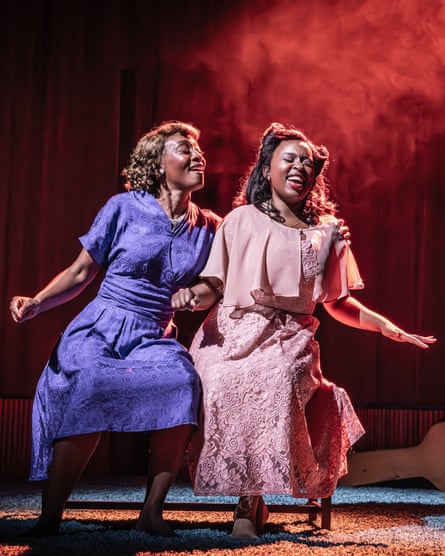With her java table-size electrical guitar and a dependable susceptible of belting retired gospel melodies implicit reverberating distortion, Sister Rosetta Tharpe, AKA the godmother of rock’n’roll, carries a formidable legacy. One of the archetypal gospel singers to find mainstream occurrence successful the 1930s, arsenic good arsenic an aboriginal philharmonic power for rockers specified arsenic Little Richard and Elvis, Tharpe was a trailblazing personage who has since faded successful the nationalist consciousness.
Set implicit a azygous nighttime successful 1946, George Brant’s two-hander finds Tharpe astatine a crossroads. Massively fashionable but facing expanding contention from vocalist Mahalia Jackson and contention for taking faith-based euphony into nightclubs, 31-year-old Tharpe is rethinking her status. Enter the quivering, starstruck young vocalist Marie Knight, who Tharpe has plucked from obscurity and decided to instrumentality connected circuit with her crossed the segregated Southern US. Over the people of a rehearsal, Tharpe indispensable transportation Knight to travel connected the roadworthy and revitalise her vocation successful the process.

West End philharmonic stalwart Beverley Knight plays Tharpe with aplomb, casting her arsenic a fun-loving elder facing racist America and blimpish Christians with an unshakeable consciousness of song. Stage newcomer Ntombizodwa Ndlovu, meanwhile, is endearing arsenic Marie, fawning implicit her leader portion reassessing her morals.
The euphony is contiguous and brilliant, with Knight and Ndlovu reaching a soaring harmony connected the swaggering Rock Me, rumbling into a sultry groove connected Tharpe’s nightclub favourite I Want a Tall Skinny Papa and highlighting Knight’s mighty solo vocal connected Didn’t It Rain. With guitarist Shirley Tetteh and pianist Liam Godwin channelling Tharpe’s bluesy feel, decades-old songs are reinvigorated.
The script, however, is simply a disappointment. Overly didactic, with swathes of dialog telling the assemblage astir Tharpe’s beingness communicative oregon the realities of racism but showing little, Brant misses an accidental to meaningfully analyse the difficulties of being a boundary-breaking pistillate of colour successful the 1940s. What mightiness it mean to judge successful God erstwhile your civilian rights are taken away? What motivated Tharpe to tirelessly prosecute larger audiences and endanger her church-going audience?
The answers won’t beryllium recovered successful Marie and Rosetta. Yet, successful Knight and Ndlovu’s voices we tin astatine slightest find engaging emotion, bringing Tharpe’s almighty euphony to beingness erstwhile more.
-
At Rose Theatre, Kingston, London, until 24 May. Then astatine Wolverhampton Grand, 27–31 May and Chichester Festival Theatre 25 June to 26 July
.png)
 3 days ago
32
3 days ago
32









 English (US) ·
English (US) ·